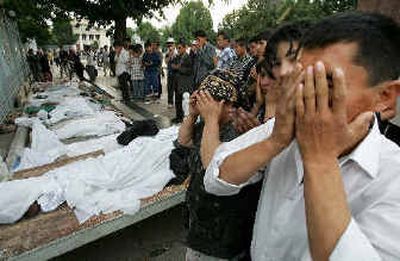Uzbek toll rises into hundreds

MOSCOW – As authorities struggled to restore calm in eastern Uzbekistan on Saturday after a bloody uprising a day earlier, President Islam Karimov defended the decision by his troops to quell the violence by firing into a large crowd, killing as many as 500 people by some estimates.
The uprising’s toll became grimly clear at dawn Saturday, as soldiers were seen by witnesses pulling up four trucks and a bus to load the bodies of men, women and children shot to death by Uzbek troops in the eastern city of Andijan.
A doctor said today that an estimated 500 bodies have been laid out in a school in the city, the Associated Press reported.
The doctor, who said she had seen the bodies, said residents were coming to Andijan’s School No. 15 to identify dead relatives, who had been placed in rows. Soldiers were guarding the school, said the doctor, who spoke on condition of anonymity out of fear for her safety.
The doctor also said she believed some 2,000 people were wounded in the clashes on Friday, but it wasn’t clear how she arrived at that estimate, the Associated Press reported.
Saidjahon Zainabitdinov, an Andijan human-rights activist who watched soldiers, estimated that at least 300 bodies were loaded on the trucks and the bus. Another human-rights activist, Lutfulo Shamsutdinov, told the Associated Press that he counted 200 bodies being loaded.
Uzbek authorities have not released a death toll. At a news conference in the Uzbek capital, Tashkent, Karimov said only that 10 Uzbek soldiers died and “many more” demonstrators were killed.
On Saturday, in the village of Kara-Suu on the Uzbek-Kyrgyzstan border, new clashes erupted Saturday as rioters set on fire Uzbek police buildings and tax offices and took a local governor hostage. Thousands of other Uzbeks fled the violence in Andijan and headed for the border, hoping to seek refuge in Kyrgyzstan.
The uprising in Andijan began early Friday morning when demonstrators overran a police station, gathered up firearms, stormed a prison and freed 23 Uzbek businessmen facing charges of membership in an Islamic extremist group. Scores of other prisoners also were freed.
The demonstrators stormed a government building and took several hostages. Later, government troops retook the building, and the demonstrators escaped with their wives and children and the hostages, according to witnesses and government officials.
Karimov said his troops were justified in firing at the fleeing protesters because they were “criminals” who tried to break through a line of Uzbek police and soldiers. He also denied allegations that Uzbek soldiers fired at women and children.
“In Uzbekistan, no one fights against women, children or the elderly,” Karimov said.
Basing his account on conversations with several witnesses, Zainabitdinov said the demonstrators and their hostages were fleeing down a roadway when soldiers positioned on both sides of the road opened fire. The demonstrators in the fleeing group were armed, but scores of women and children in the group were not, he said.
“Those people did not expect that the troops would open fire,” Zainabitdinov said. “It was a situation that was next to impossible to escape. The troops ambushed from both sides of the road.”
Zainabitdinov, who lives near where the soldiers opened fire on the crowd, said he surveyed the scene afterward. “There were pools of blood everywhere,” he said. “There were bodies all over the place, spent cartridges, dozens of shoes and umbrellas scattered all over the street.”
Though Uzbek security forces regained control of Andijan on Saturday, thousands of protesters massed in the city square to denounce the government’s violent crackdown on demonstrators Friday.
“They wanted someone to be held responsible for the bloodshed,” said Mirafror Akhrorov, a Tajik journalist with Radio Liberty who was in Andijan on Saturday morning. “Some of them were saying, ‘Look what the authorities have done to us! Somebody has to pay!’ “
The Uzbek government appeared to be trying to restrict media coverage of the ongoing violence. Russian television journalists in Andijan reported that Uzbek authorities arrested them and seized their passports. Roads in and out of the city were blockaded.
In an indication of how seriously regional leaders regard the instability in Uzbekistan, Karimov spoke with Russian President Vladimir Putin on the phone Saturday.
“Both sides expressed concern about the danger of the destabilization of the situation in the Central Asian region,” the Kremlin news service said in a statement.
Karimov blamed Friday’s violence on an offshoot of an Islamic extremist group called Hizb ut-Tahrir, which is outlawed in Uzbekistan. The group advocates the establishment of an Islamic caliphate across Central Asia. The 23 men freed by demonstrators Friday were on trial on charges of belonging to a branch of Hizb ut-Tahrir known as Akramiya.
Karimov also cited the uprising that led to the overthrow of Askar Akayev’s government in Kyrgyzstan in March in explaining his regime’s harsh reply to the violence in Andijan.
Blaming the Kyrgyz uprising on “the weakness of authorities there,” Karimov said protesters in Andijan expected his government to react similarly.
“They had hoped that neither the local authorities nor the state authorities of Uzbekistan would demonstrate firmness, as it happened in Kyrgyzstan,” Karimov said. “They wanted a repeat of the events in Kyrgyzstan and they wanted to move what happened in Andijan to Tashkent.”